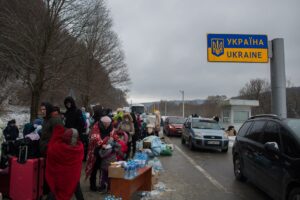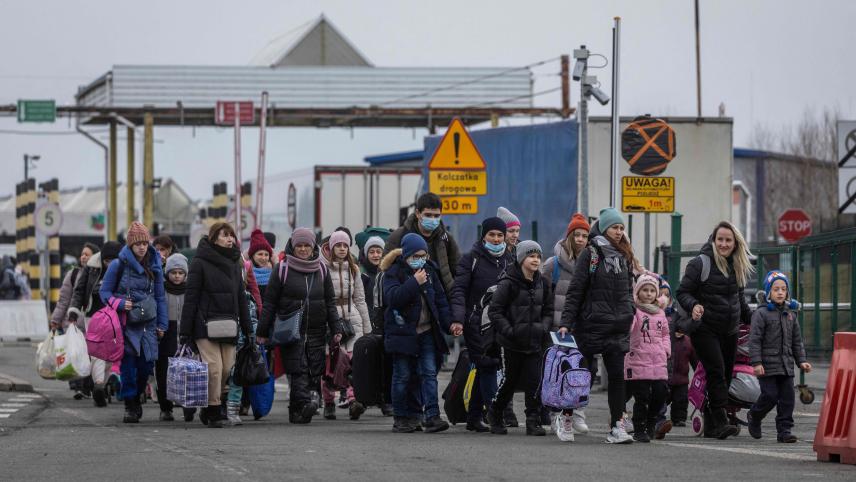The European Commission announced on Wednesday that it is proposing to activate its temporary protection directive to offer quick and effective assistance to people fleeing the war in Ukraine.
As already reported, those fleeing the war will be granted temporary protection in the EU, meaning that they will be given a residence permit, and they will have access to education and to the labour market.
EU announced already last week that it had activated the EU Civil Protection Mechanism and that 18 member states were channelling critical humanitarian equipment to Ukraine.
“In a historically unprecedented move, the Commission is today proposing to grant immediate protection in the EU for those fleeing Ukraine, said Margaritis Schinas, Vice-President for Promoting out European Way of Life. “All those fleeing the war will be provided with a secure status and access to schools, medical care and work."
At the same time, EU is working to facilitate efficient crossings at the borders for people and their pets, with the necessary security checks. “The times are bearing heavily down upon us but the EU and every single one of its member states is showing beyond a doubt that we are ready to step up to the plate and stand in solidarity with Ukraine.”
The Commissioner for Home Affairs, Ylva Johansson, added that, “We will make sure those fleeing the war in Ukraine can get to the EU quickly, without going through lengthy formalities at the borders.”
Currently, there are long queues of vehicles on the roads leading to the border crossings with people, mostly women, children and elderly people, waiting in difficult conditions for several hours to cross the borders. Men at the ages from 18 to 60 have to stay to defend Ukraine and are not allowed to leave the country.

Credit: Belga
Since the Russia's military invasion of Ukraine, 935,000 people have fled to neighbouring EU member states, according to the latest figures from UN’s refugee agency (UNHRC). Moldova has also received Ukrainian refugees. An additional 96,000 people have moved to Russia from the Donetsk and Luhansk regions. Poland and Hungary, two countries that in the past refused to accept non-European refugees, have received over 500,000 respectively 100,000 refugees from Ukraine.
In her speech in the European Parliament on Wednesday, Commission President von der Leyen thanked especially Poland, Romania, Slovakia and Hungary for welcoming the women, men and children fleeing the war in Ukraine.
Von der Leyen assured that, “Europe stands by those in need of protection. All those fleeing Putin's bombs are welcome in Europe. We will provide protection to those seeking shelter and we will help those looking for a safe way home.”
UN fears that the number of refugees fleeing the war might increase to up to 5 million people if no immediate cease-fire is agreed upon and no political solution acceptable to both sides is found soon. The more the war continues and becomes more brutal, with Russian indiscriminate attacks against Ukrainian cities and civilian infrastructure, the worse the humanitarian situation will become.
“All Western countries, not just those in the EU, should open their borders to Ukrainians and ensure that the find safety and stability after escaping the chaos of war,” David Miliband, chief executive of the International Rescue Committee and former British foreign secretary, wrote in an op-ed. “That means fully-fledge refugee status, with the rights to work and receive state servicers.”
The Temporary Protection Directive was specifically conceived to give immediate protection to the persons who need it and to avoid overwhelming Member States' asylum systems. Under the Commission’s proposal, Ukrainian nationals and people who have made Ukraine their home as well as their family members displaced by the conflict will be entitled to protection across the EU.
Non-Ukrainian nationals and stateless people legally residing in Ukraine who cannot return to their country or region of origin, such as asylum seekers or beneficiaries of international protection and their family members, will also be granted protection in the EU.
Others who are legally present in Ukraine for a short-term and are able to return safely to their country of origins will fall outside the scope of this protection. Nevertheless, they should be allowed access to the EU to transit prior to returning to their countries of origin.
It is now for the Council to adopt the Temporary Protection proposal. The Council already expressed broad support for the proposal at the extraordinary meeting of 27 February and has committed to discussing it at the Justice and Home Affairs Council today (3 March).
Once adopted, temporary protection would start applying immediately and run for one year. This period is extended automatically by six monthly periods for a further year.
M. Apelblat
The Brussels Times

